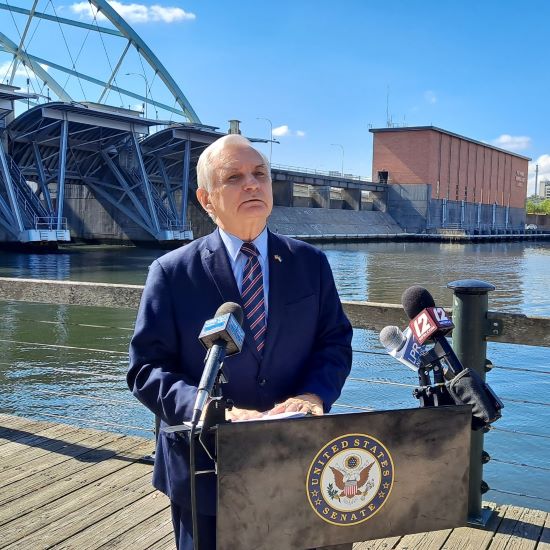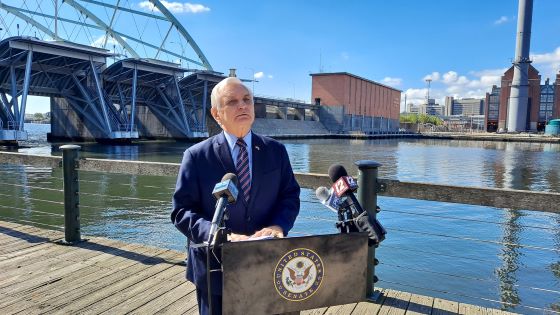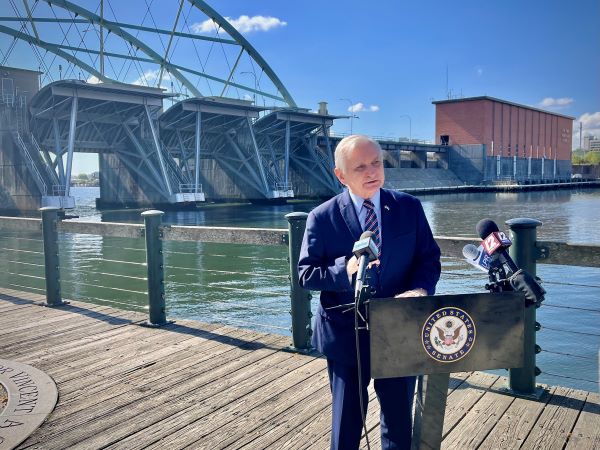Reed Warns Against Dismantling Critical Hurricane Agency

Sen. Reed Calls Out Climate Change Deniers and Says Project 2025’s Plans to Gut National Weather Service and Emergency Management Would be a Major Disaster
PROVIDENCE, RI — As flood-stricken states grapple with the fallout from Hurricane Helene, U.S. Senator Jack Reed says the federal government must continue to help states prepare for emergencies like hurricanes, accurately predict storms, and effectively assist those impacted with coordinated recovery, rescue, and rebuilding efforts.
As the 2024 Atlantic hurricane season continues, Senator Reed visited the Fox Point Hurricane Barrier today to sound the alarm over Project 2025’s calls to “break up and downsize” the National Oceanic and Atmospheric Administration (NOAA), privatize the National Weather Service (NWS), and end aid to states for preparedness grants, which would cost Rhode Island tens of millions of dollars annually.

Project 2025’s manifesto states: “The National Oceanographic and Atmospheric Administration (NOAA) should be dismantled and many of its functions eliminated” (page 664). The group’s backers falsely assert the data NOAA provides is “one of the main drivers of the climate change alarm industry,” and “harmful to future U.S. prosperity” (page 675). The report also says that the Office of Oceanic and Atmospheric Research should be “downsized” while much of its climate change research should be “disbanded.”
Senator Reed says that if Project 2025 backers follow through with their stated goals, it would hurt the Ocean State and Americans living in coastal communities especially hard. He warned that creating a new paywall for accurate weather forecasts could jeopardize public safety before and during major storms.

“Trump’s Project 2025 supporters are seeking to inject politics and profit motives into what should be free, scientific, and data-driven weather forecasts,” said Senator Reed, a member of the Appropriations Committee who helped advance through the Senate Appropriations Committee a bipartisan Appropriations bill that includes $1.9 billion for NOAA weather satellites, $102 million above fiscal year 2024. These weather satellites are critical to accurate weather prediction that people, businesses, and communities rely on each and every day.
Reed noted that in the deadly aftermath of Hurricane Helene, Donald Trump suggested climate change is “one of the great scams of all time.”
Reed stated: “Let’s be clear: climate change is real and we need collective action to address it. We need honest, principled leadership. During his presidency, Donald Trump failed in both the preparation for and disaster response to hurricanes, storms, and flooding. He often made things worse. For example, he delayed disaster aid for hurricane-devastated Puerto Rico. In another instance, he got out his sharpie and tried to alter the storm’s trajectory to suggest Alabama would be hit. When the National Weather Service corrected his claim, he threw a fit. The NWS experts were right. Donald Trump was wrong. That storm never hit Alabama and Trump never should have injected his blatantly false partisan ideology into something like a routine weather forecast.”
Later, the U.S. Department of Commerce’s internal watchdog concluded “Sharpiegate,” as it was known, needlessly risked public safety, eroded public trust in weather warnings, and damaged NOAA’s reputation for issuing apolitical guidance.
“That is exactly what Trump and the Project 2025 manifesto are threatening to do now through these terrible policy proposals. Project 2025 itself should serve as a dire warning about what a second Trump would be: a disaster for the American people,” concluded Reed.
Thanks to Senator Reed’s leadership and years of strategic federal investments, NOAA is increasing its presence in Rhode Island and bringing some premiere ocean research jobs, vessels, and operations to the Ocean State. When it is completed, the new $150 million NOAA hub will help support dozens of Rhode Island-based jobs on land and at sea. Approximately 60 NOAA staffers worked at the NOAA MOC-A office in Norfolk, Virginia before it was moved to Newport, Rhode Island and many more also worked aboard vessels and were based in the area when not at sea.